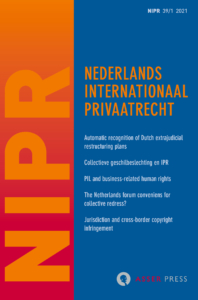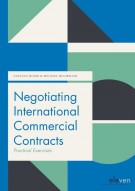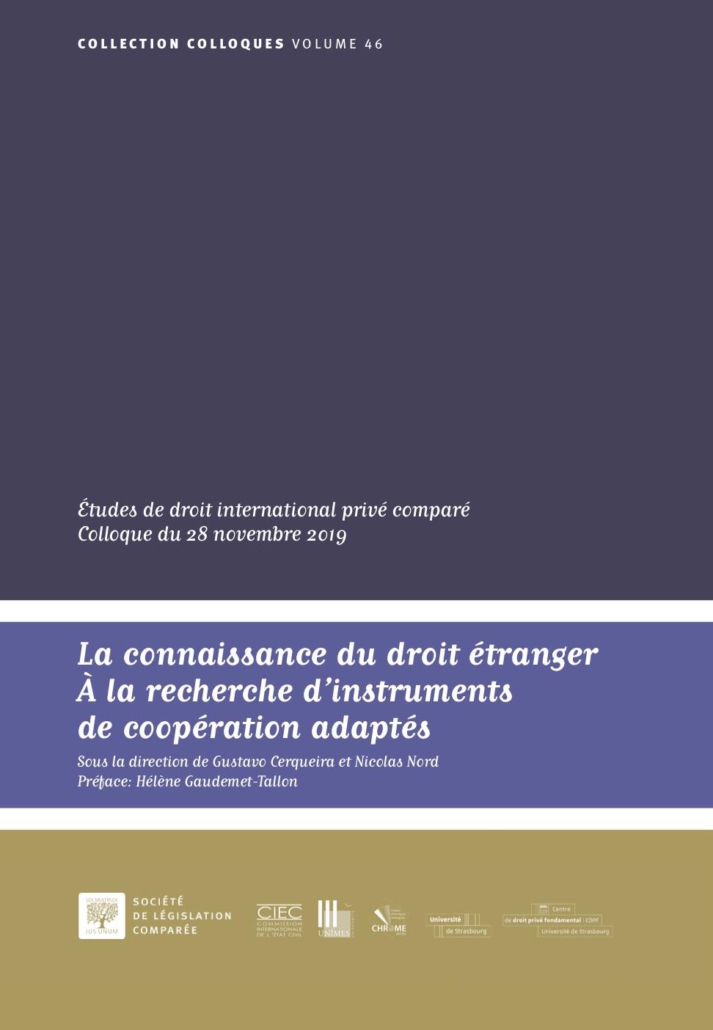First Issue of 2021’s Journal of Private International Law
The first issue of the Journal of Private International Law for 2021 was released today and it features the following articles:
Paul Beaumont, Some reflections on the way ahead for UK private international law after Brexit
Since 1 January 2021 the UK has moved out of the implementation period for its withdrawal from the European Union (EU) and it is an appropriate time to reflect on the way forward for the UK in developing private international law. This article considers the practical steps that the UK should take in the near future. There is significant work that the UK can do to progress its commitment to the “progressive unification of the rules of private international law” by improving its commitment to the effective functioning of several key Conventions concluded by the Hague Conference on Private International Law (HCCH). Some of these steps can and should be taken immediately, notably accepting the accessions of other States to the Hague Evidence and Child Abduction Conventions and extending the scope of the UK’s ratification of the Adults Convention to England and Wales, and Northern Ireland. Other things require more consultation and time but there are great opportunities to provide leadership in the world by ratifying the Hague Judgments Convention 2019 and, when implementing that Convention which is based on minimum harmonisation, providing leadership in the Commonwealth by implementing, at least to some extent, the Commonwealth Model Law on Recognition and Enforcement of Civil and Commercial Judgments. Within the UK, as a demonstration of best constitutional practice, intergovernmental cooperation between the UK Government and the devolved administrations should take place to consider how intra-UK private international law could be reformed learning the lessons from the UK Supreme Court’s highly divided decision in Villiers. Such work should involve the best of the UK’s experts (from each of its systems of law) on private international law from academia, the judiciary and legal practice. Doing so, would avoid accusations that Brexit will see a UK run by generalists who give too little attention and weight to the views of experts. This use of experts should also extend to the UK’s involvement in the future work of HCCH at all levels. The HCCH will only be able to be an effective international organisation if its Members show a commitment to harnessing the talents of experts in the subject within the work of the HCCH.
Reid Mortensen, Brexit and private international law in the Commonwealth
“Brexit is a trading and commercial opportunity for the countries of the Commonwealth, as it makes it likely that, for many, their access to United Kingdom (UK) markets will improve significantly. The question addressed in this article is whether, to support more open and trading relationships, Brexit also presents opportunities for the development of the private international law of Commonwealth countries – including the UK. Focusing on Australia, Canada, New Zealand and Singapore, as well as the UK, an account is given of the relationship between the different systems of private international law in these Commonwealth countries in the period of the UK’s membership of the European Union (EU). Accordingly, consideration is given to the Europeanisation of UK private international law and its resistance in other parts of the Commonwealth. The continuing lead that English adjudication has given to private international law in the Commonwealth and, yet, the greater fragmentation of that law while the UK was in the EU are also discussed. The conclusion considers the need to improve the cross-border enforcement of judgments within the Commonwealth, and the example given in that respect by its federations and the trans-Tasman market. Possible directions that the cross-border enforcement of judgments could take in the Commonwealth are explored.”
Trevor Hartley, Arbitration and the Brussels I Regulation – Before and After Brexit
This article deals with the effect of the Brussels I Regulation on arbitration. This Regulation no longer applies in the UK, but the British Government has applied to join the Lugano Convention, which contains similar provisions. So the article also discusses the position under Lugano, paying particular attention to the differences between the two instruments. The main focus is on the problems that arise when the same dispute is subject to both arbitration and litigation. Possible mechanisms to resolve these problems – such as antisuit injunctions – are considered. The article also discusses other questions, such as freezing orders in support of arbitration.
Maksymilian Pazdan & Maciej Zachariasiewicz, The EU succession regulation: achievements, ambiguities, and challenges for the future
The quest for uniformity in the private international law relating to succession has a long history. It is only with the adoption of the EU Succession Regulation that a major success was achieved in this field. Although the Regulation should receive a largely positive appraisal, it also suffers from certain drawbacks that will require a careful approach by courts and other authorities as to the practical application of the Regulation. The authors address selected difficulties that arise under its provisions and make suggestions for future review and reform. The article starts with the central notion of habitual residence and discusses the possibility of having a dual habitual residence. It then moves to discuss choice of law and recommends to broaden further party autonomy in the area of succession law. Some more specific issues are also addressed, including legacies by vindication, the relationship between the law applicable to succession, the role of the legis rei sitae and the law applicable to the registries of property, estates without a claimant, the special rules imposing restrictions concerning or affecting succession in respect of certain assets, as well as the exclusion of trusts. Some proposals for clarifications are made in that regard.
Stellina Jolly & Aaditya Vikram Sharma, Domestic violence and inter-country child abduction: an Indian judicial and legislative exploration
The Hague Convention on the Civil Aspects of International Child Abduction aims to prevent the abduction of children by their parents by ensuring the child’s prompt return to his/her place of habitual residence. At the time of drafting the Convention, the drafters believed that non-custodial parents who were fathers perpetrated most of the abductions. However, the current statistics reveal the overwhelming majority of all abductors as primary or joint-primary caretakers. Unfortunately, it is unknown what exact proportion of these situations includes abductions triggered by domestic violence. In the absence of an explicit provision of domestic violence against spouses as a defence against an order of return, for a parent who has abducted a child to escape domestic violence, the relevant defence is of “grave risk of harm” to and “intolerable situation” for the child under Article 13(1)(b) of the Convention. However, the lack of guidance on what constitutes “grave risk” and “intolerable situation”, at least in the past, and its operationalisation in the context of domestic violence brings in pervasive indeterminacy in child abduction. In 2012, the Hague Conference on Private International Law identified “domestic violence allegations and return proceedings” as a key issue and recommended steps for developing principles on the management of domestic violence allegations in return proceedings leading to the adoption of a Good Practice Guide on this issue in 2020.
The Ministry of Women and Child Development (WCD) and the Ministry of Law and Justice, India, cite that most Indian parents who abduct their children happen to be women escaping domestic violence abroad. Thus, they are victims escaping for themselves and their children’s safety. This research has summed up the judgments delivered by High Courts and the Supreme Court of India on child abduction between 1984 and 2019. Through judicial mapping, the paper discusses the cases in which battered women have highlighted and argued domestic violence as a reason against their children’s return. The paper evaluates whether the reason given by the two ministries against India’s accession to the Hague Convention is reflected in cases that have come up for judicial resolution and what are the criteria evolved by the judiciary in addressing the concerns of domestic violence against a spouse involved in child abduction. The paper analyses India’s legislative initiative, the Civil Aspects of International Child Abduction Bill, 2016 and assesses the measures proposed by the Bill for considering domestic violence against a spouse in abduction cases.
Kittiwat Chunchaemsai, Legal considerations and challenges involved in bringing the 2005 Hague Convention on Choice of Court Agreements into force within an internal legal system: A case study of Thailand
Thailand must consider two vital elements, namely its internal legal system and environment before signing the Hague Convention on Choice of Court Agreements 2005 (Hague Convention). This paper investigates whether the law of Thailand in its current form is inconsistent with the Hague Convention. Articles 1–15 are examined to identify areas of inconsistency and to suggest appropriate solutions. This study finds that the internal legal system of Thailand is not quite in line with the Hague Convention. This conclusion leads to analytical recommendations to suit the needs of the current Thai legal system. Implementing these recommendations is necessary for Thailand if it intends to become a Party to the Hague Convention. Thailand must not only have a specific implementation act but must also review and revise the relevant laws appropriately.
Saeed Haghani, Evolution of lex societatis under Iranian law: current status and future prospects
There has been a growing attention to applicable law to companies (lex societatis) in Iranian legal research. A brief study of relevant legal literature leads us to a list of both disagreements and complexities on the subject. Meanwhile, a recent parliamentary effort on the issue, illustrates the importance of lex societatis in the eyes of the Iranian legislature. A comparative approach would be of great help in the analysis of the formation and evolution of relevant Iranian legal rules. This paper tries to provide the reader with a comprehensive view of the current transitory state of Iranian law regarding lex societatis.

 follow summary:
follow summary: